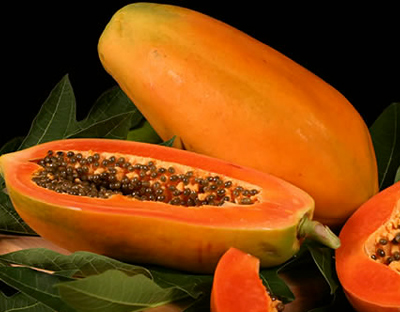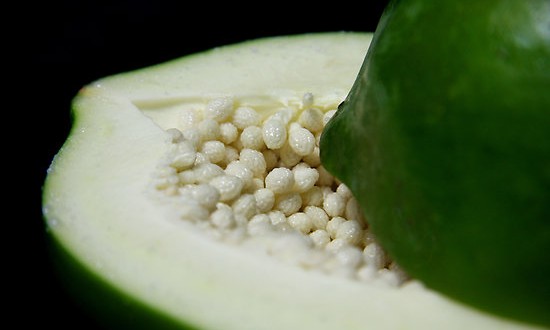Is papaya your favorite fruit? If yes, then you should know that it is a very healthy breakfast option. Papaya is good for your digestive system, hair and skin. However, if you happen to be pregnant, you might have to stay away from your favorite fruit for nine months. However, you can always apply ripe papaya on your face and hair, for glowing skin and smooth tresses. The beneficial properties of papaya might not work when you are pregnant. It is important to know why.
Papaya is a tropical fruit which tastes delicious and is healthy as well. This fruit is packed with minerals, calcium, potassium, fiber, flavonoids and carotenoids. Papaya is considered as a fruit supplement to improve cardiovascular health and provide protection from colon cancer.
Is papaya good during pregnancy? Even though the fruit is healthy, women during their pregnancy are often advised by doctors to avoid eating papaya. In the countries such as Bangladesh, India, Pakistan, and Sri Lanka, it is believed that papaya can cause miscarriage or even natural abortion.
Is it really true? Let’s check out some facts and get to the conclusion whether papaya is safe to consume during pregnancy.
Benefits of Eating Papaya in Pregnancy:
In some cases, consumption of papaya during pregnancy is thought to be absolutely safe. Here are they:
Fully’ ripe papaya has reduced latex concentration that doesn’t cause harm in pregnancy.Generally, the latex present in green papaya cause allergies in many people. It causes redness, itching, inflammation, dizziness, abdominal pain and difficulty in swallowing. Those who are allergic to papaya also react to kiwi fruit, pineapples, melons, figs, bananas and avocadoes. So stay away from these foods if you are allergic. Consult your doctor before you include any new food in your diet during pregnancy.
Ripe papaya is packed with nutrients, but should be consumed in small amounts. It is said that unripe papaya is not safe for pregnancy, but a fully ripe papaya does no harm. However, it is better to be careful while consuming papaya during pregnancy.
Ripe papayas also contain beta-carotene, vitamins A, vitamin B, vitamin C and potassium which are needed by the body.Vitamin A and C is needed to boost the body’s immunity, while vitamin B is essential for development of foetus.
Papaya is helpful in controlling and preventing constipation and even heartburn. Papaya helps to curb morning sickness and stomach cramps that are common during pregnancy. It also relieves bloating and gastric disorders common during pregnancy. Papain content in ripen yellow papayas are also thought to aid digestion.
Ripe papaya is helps in increasing hemoglobin levels. The rise in hemoglobin levels aids in more oxygen absorption. This helps to keep anemia and respiratory problems at bay.
Papaya can be effective in dealing with inflammatory bowel syndrome during pregnancy. A medium papaya has 119 of calories, 29.8 g total carbs and 5.5 g dietary fiber.
Papaya is rich in sugar content. One medium papaya contains approx. 17.9 g sugar. The sugar content helps to provide energy and provides relief from fatigue, which is common during pregnancy.
You can also consume ripe papaya during your pregnancy to ease pre and post-partum symptoms.
You can mix ripe papaya with some milk and honey. This acts as a tonic and is very good source of many nutrients that is best for pregnant women and lactating mums. Papaya has galactagogue properties that help in increased milk production.
Papaya has a wide range of medicinal properties like it is a natural antiseptic. Papaya also have anti-microbial, anti-parasitic, anti-inflammatory, diuretic, anti-diabetic, anti-hypertensive and anti-hyperlipidemic. The wide range of medicinal properties makes papaya a healthy option. However, it is advisable to check with your doctor the effect of these medicinal properties on your pregnancy.
The Risks of Eating Papaya in Pregnancy:
There is no doubt that papaya is good for health. Well that is applicable for normal conditions, while you are pregnant, papaya might not be a good option since it can cause abortion or miscarriage. Let us know whyunripe papaya isn’t safe at all during pregnancy. Here are few reasons why it should be avoided.
Unripe or even semi-ripen papaya includes latex that can activate uterine contractions. Papaya is generally used to treat irregular menstrual cycle and it is a potent emmengogue. Papaya can lead to uterine contractions and induce synthetic labour, this leads to miscarriage.The papaya latex has an enzyme called papain which activates prostaglandin and oxytocin hormones that strengthens and starts labour contractions.
The latex content in the unripe papaya also leads to pre-mature induction of the labour. This may also cause abortion and abnormalities in your baby. Generally papain extracts or papaya is given to those whose labour pains have not started at expected time of delivery. Papain is given by doctor in this case to start the labour pain.
Unripe papayas are considered unsafe during the pregnancy due to its pepsin and papain content that can slow down the growth and development of your foetus. In few cases, papain can ruin the chance of the foetus’s survival. Laboratory research reveals that consuming papaya or parts of the papaya plant during pregnancy can cause anti-implantation, increased chances of post-implantation loss and embryo toxicity.
Papain content in unripe papaya can weaken the vital membranes, which affects the survival of your foetus.Papain being a proteolytic enzyme is popularly used for cell dissociation. Cell dissociation is nothing but divison of cells into smaller parts. This slows down cell growth and tissue development in the foetus. Thus the chances of foetus’ survival become nil.
Unripe papaya also contains oedema, which is a latex-like substance and is considered bad for pregnant women. This can cause haemorrhage and even bleeding in the placenta.Generally oedema is common during pregnancy, it is caused by fluid retention in the body. It causes swelling and puffiness. The latex in the papaya aggravates oedema.The inflammation exerts pressure on the blood vessels and cause blood to pool. It also slows down blood circulation. Excess pressure on the blood vessels can cause internal haemorrhage and it can affect the growing embryo in the womb.
Haemorrhage placentas can trigger bleeding in placentas and again put the foetus’s life at risk. Haemorrhage in placenta causes complications during pregnancy and delivery. Papaya can cause disruption in placental formation as well, so it is not a good idea to have papaya during the early stages of pregnancy.It is very difficult to discern the ripeness of papaya, you never know the amount of latex present in it so it is better to avoid papaya entirely.
Papaya relieves constipation; sometimes excess bowel movement can also create pressure in the uterus and cause miscarriage.Though papaya is a great tonic for the digestive system, this beneficial property can cause harm to pregnant women. Papaya is rich in fiber, it exerts a little pressure on the stomach and intestines. This pressure might cause miscarriages. So avoid papaya even though it helps to relieve constipation and other gastric disorders during pregnancy.
Papaya seeds and leaves, which are often consumed, have a toxic substance called carpine that damages the central nervous system.
Papaya has two enzymes papain and chymopapain. Both these enzymes are teratogenic and abortifacient. Well abortifacient means papain will cause abortions. While teratogenic implies that the enzymes will affect the physiological growth of the foetus.
Woman with abortion and premature labour history due to the uterus contraction can experience bad effects from papain. Thus, it is advised to avoid the consumption of papayas especially in pregnant women who may have faced such problems before.
Women who don’t want to get pregnant can consume unripe papayas. This acts as a natural contraceptive to keep pregnancy at bay. Papain present in papayas suppresses progesterone, the female reproduction hormone which is responsible for preparing the uterus for pregnancy. Papaya is widely used Asian cuisine and many women have papayas for its natural contraceptive property. So that they can reduce the chances of side effects from birth control pills.
Source: mom junction



